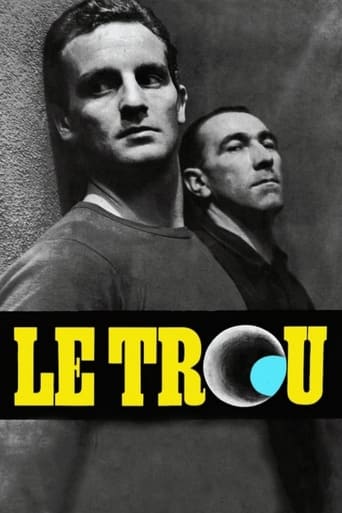rodrig58
This film is absolutely exceptional, from all points of view: story, actors, director, cinematography, everything. If you like movies with action in prisons, this is the best of all. And the most realistic (the script is inspired by a true story). Although static, because all the action is taking place in a prison cell, the film has great tension and is watching with the soul to the mouth. Michel Constantin and Philippe Leroy in their best roles. Great, great film!
morrison-dylan-fan
During the bank holiday I decided to look online for any special DVD deals. Being a big fan of their Casque D'Or and Touchez Pas Au Grisbi presentations,I was thrilled to find Studiocanal's DVD of auteur film maker Jacques Becker at a great price,which led to me jumping into the hole.The plot:Sent to prison after accidentally (not fatally!) shooting his wife during a row, Claude Gaspard is welcomed into a prison filled to the brim. With there being no free cells left,Gaspard is chucked in with Roland Darban/Manu Borelli/Monseigneur and Jo Cassine. Breaking the ice,the guys reveal that they are each serving 10-20 year jail term. Hearing Gaspard talk about his possible 10 year term,the group decide to reveal their secret:They plan to escape the jail. Given the job of watchmen,Gaspard watches the guards go by,as the team dig a hole into their sentences.View on the film:Completed just two weeks before he died, (after which producer Serge Silberman cut 24 minutes from the cut,that remain lost) co- writer/(with Jean Aurel and José Giovanni) director Jacques Becker (whose son Jean has a cameo) & cinematographer Ghislain Cloquet play an extraordinary crescendo to Becker's pessimistic Noir universe. Re-creating the real prison for this "ripped from the headlines" tale,Becker lingers on each layer of the hole to dig into the dirt of the cell,with the clever move to not have a score leading to the industrial tools being the only sound in the cramped cell.Limiting the feminine touch to an uncredited appearance from a feature film debuting Catherine Spaak, Becker (who used the widescreen format for the first time)and Cloquet caves in the pent- up adrenaline with tightly coiled shots in the jail,which break up into a hole of ultra-stylised reflecting shots and dives across the prison sewers,as the team see daylight shining from the isolation. Working with most of the real inmates as "advisors",Becker and his fellow writers brilliantly gather the Noir and non-Noir creations of auteur Becker,via Gaspard being the youthful,loved-up outsider who follows Becker's Rendezvous in July and Antoine and Antoinette,who teams up with a "family" of working class Noir loners who drill into the family roots of Becker's It Happened at the Inn and the life of crime smarts of Becker's Touchez Pas au Grisbi,as Jacques Becker unlocks the Noir cells for the final time.
tieman64
Jacques Becker's minimalist and effective "The Hole" tells the story of five prisoners, housed in a French prison during the late 1940s, who plot to dig a tunnel and so escape confinement. Becker would use mostly non-actors for the film's central roles, and seems heavily influenced by both Bresson's "A Man Escaped" and the "prisoner of war" movies of Jean Renoir, a director for whom Becker was an assistant. Becker would die of a heart attack shortly after completing his film."The Hole's" characters are an odd bunch, some sentenced for murder, some mysteriously aloof, some from privileged backgrounds and some suspiciously regarded by others as being untrustworthy at best, prison spies at worst. This all strongly recalls Bresson's (superior) "A Man Escaped", in which a character frets over whether or not to trust or kill a cell mate prior to proceeding with his plans for escape. Bresson's hero decides to trust, there are no betrayals, and the film eventually celebrates the prospects of humanity (the escape would have failed without our hero trusting his fellowman). Becker's film, however, presents the more sour, cynical flip-side to Bresson's; it's a film about disloyalty and the impossibility of solidarity."The Hole's" cinematography, by Ghislain Cloquet, also recalls Bresson's work, which was likewise gracious and almost saintly. And like "A Man Escaped", Becker's film features a heightened use of sounds; the chipping away of concrete, the scraping of metal, heavy breathing and long, tense silences. His plot and tone are wonderfully minimalist, recalling Dassin and Melville's work during the period. Melville would regard "The Hole" as a personal favourite.8/10 – Worth one viewing.
runamokprods
A unique prison escape film, full of very specific, realistic details and devoid of almost any prison movie clichés. The characters all prove more complex then we assume at first glance. Perhaps that's because it's based on a true story. In fact the cast are all non-pros, and one was actually involved in the real escape plan. I was lukewarm while I watched the body of the film, but by the end it had an emotional and intellectual effect far more powerful than I expected. There were a couple of illogical moments that made me wonder if the real story was being followed honestly. But, ultimately that didn't really matter. Whatever the blend of truth and fiction this is a tense, powerful, entertaining film, one of the better prison films ever made.



